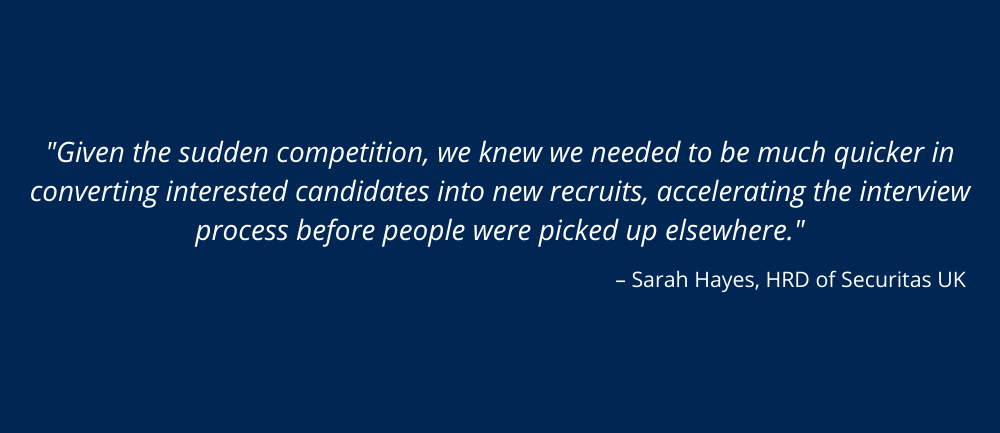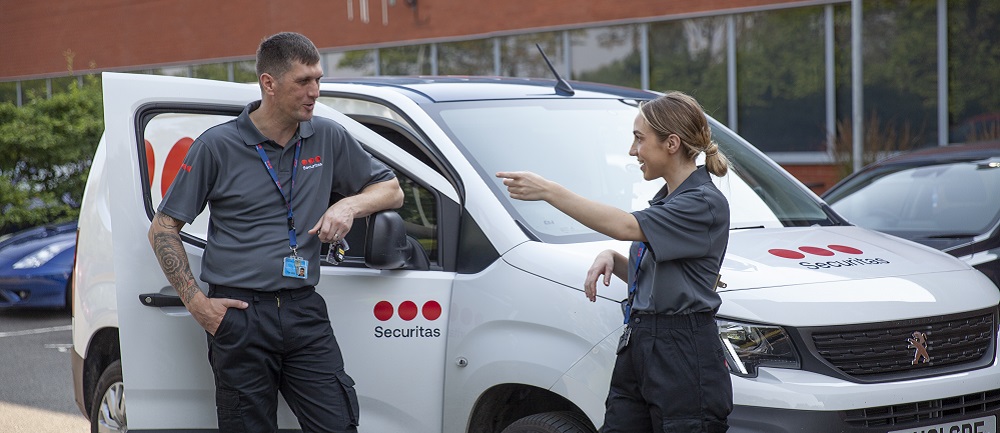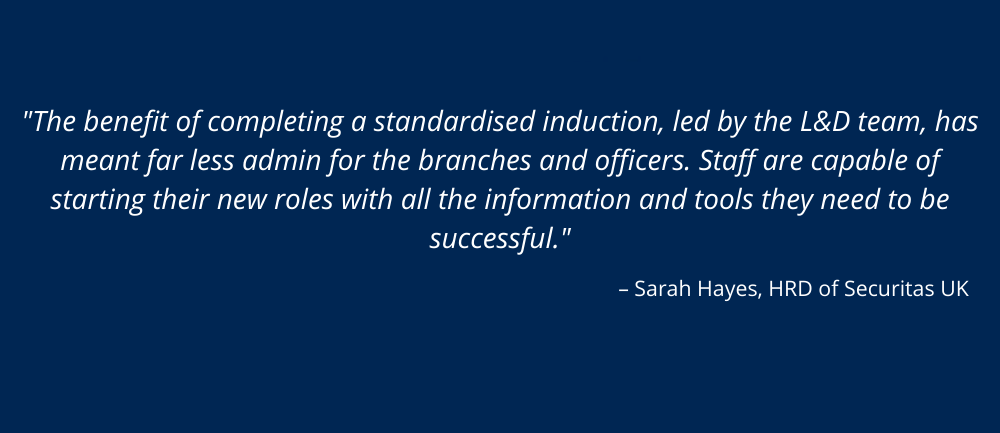-
Provided by

- Date published: Sep 7, 2021
- Categories
Securitas claims that security professionals are the ‘unsung heroes’ of the pandemic; key workers helping to keep people and property safe and secure, working on-site to provide security for offices, warehouses, transport hubs, hospitals and other critical national infrastructure.
At the outset of the pandemic, Securitas made the decision to ask employees with back-office roles to work remotely. However, their security officers and engineers on the front line faced uncertainty and were isolated from colleagues and clients while looking after empty premises. Securitas’ HR teams had to deal with the associated health risks, from protecting the physical safety of officers and engineers to looking after the mental wellbeing of all colleagues, which involved a wide range of activities, processes and procedures.
Additionally, Securitas faced a number of staffing issues that other firms faced, including recruiting top talent in a straitened labour market and making a success of remote onboarding.
In this case study, Sarah Hayes, HRD at Securitas UK, outlines how the firm overcame its talent challenges and oversaw a number of positive changes to its HR teams.
Defining the challenge
During 2020, recruitment did not present a problem to Securitas UK, given the availability of applicants who had been made redundant as a result of pandemic restrictions. In addition, we were able to offer opportunities to people who had been furloughed by their employers. This meant we were able to fully meet all our clients’ requirements at a time when there was a great deal of uncertainty and fear.
Approximately 1,500 Securitas UK employees were furloughed, either because they were classed as vulnerable or because they worked on client sites that were forced to close, in sectors such as retail and aviation.
Of course, now the picture across Europe has completely changed and recruitment has become really tough. In the UK, there’s a perfect storm brewing as a result of Brexit limiting the pool of candidates whilst a buoyant jobs market develops as the country opens up.
In Securitas, we haven’t seen the number of applications we would normally expect; there are more cases of applicants not attending interviews, and we are finding that successful candidates are not accepting job offers.

Refining the onboarding process
With these challenges, we’ve had to be more creative with our onboarding. From the start of the pandemic, we switched to Microsoft Teams interviews, created an online induction programme and moved to virtual learning.
Now, rather than relying on traditional job boards and aggregators, we’ve been working hard to connect with sources of potential new recruits; for example, government-funded training agencies, organisations dealing with transitions for ex-military personnel, job centres and charities which help vulnerable people back into the workplace.
Given the sudden competition, we knew we needed to be much quicker in converting interested candidates into new recruits, accelerating the interview process before people were picked up elsewhere.
In the past, our local branch managers have dealt with recruitment in their own local teams. However, we have fast-tracked the process, with dedicated recruiters who sift applications and set up immediate online interviews on behalf of the branches.
Merging our recruitment and onboarding team has streamlined the process and enabled a greater focus on supporting the branches. This has included our new online, personalised induction process with weekly virtual sessions for up to ten new recruits at a time.

Engaging the workforce
Each team of new recruits join an informal, interactive mini-community where they get set up on all our systems, talk through process and procedures and discuss all the important things they need to know in their new role.
They watch a welcome from our country president and find out how they can develop their career with Securitas, a global organisation present in 48 countries. Of course, we also tell them all about Securitas perks, our employee benefits.
These mini-communities create brilliant networks for our new starters. It’s somewhere they can go to ask for advice and help and meet colleagues in the same position as them. Early engagement has had to be the focus on recruitment, and we have worked hard to find ways to differentiate us from the competition.
A recent research report from engagement and culture specialists Achievers, has suggested engagement is in decline, with only 28% of employees describing themselves as more engaged and 37% saying they were less engaged.
However, the latest UK report among Top Employers showed that 83% of Top Employers have a defined engagement strategy and 61% expect their managers to have objectives/KPIs relating to improving employee engagement.
It’s not just in recruitment that we have had to look at engagement. Over the past couple of years, we have introduced a wide programme of engagement activities that are transforming our business.
Our e-learning offering has grown enormously. All our employees, including new starters, are required to complete bronze level training which includes modules on customer service, terror legislation, D&I, mental health and first aid.
We’ve developed comprehensive silver and gold learning programmes for first-time and experienced line managers, and there are plans for further modules.
Our new offering also includes level 3 to level 5 ILM qualifications – too often when managers are promoted they copy what they have previously seen. However, our e-learning helps our managers understand different leadership and management styles which means they can manage their teams more effectively and create a better working environment for everyone.

This year we’ve actively engaged in a whole range of worthy initiatives, including International Women’s Day, Wellbeing Week and we’ve celebrated Pride for the first time, with a fun-filled week of educational activities.
We’ve established six staff networks specifically for LGBTQ+, women and people with a disability or who are neurodiverse, and for people from different ethnic backgrounds. Additionally, we are developing a team of 100 D&I champions across the UK.
In August, we ran out first ever ‘Securitas has got talent’ competition – a huge success, with entries from colleagues across the business.
We’re proud to be sponsoring Gratitude, a spectacular public art installation that pays tribute to NHS staff and key workers. We have sponsored one of the sculptures to highlight the important role security officers and engineers played as key workers throughout the pandemic. We are encouraging all our people and their families to visit the installation as it tours the UK.

Gaining support from the C-suite
In Securitas UK, HR is at the top table – the HRD is a member of the core, executive team. However, this doesn’t mean that it’s easy to implement new ways of working or change the way we do things, particularly as we are part of a global organisation where consistency of approach is important across 48 countries.
For example, our change in recruitment was largely driven by a northern European business transformation project, which is being implemented across 11 countries.
In seeking core team approval for the changes to onboarding, it was important to show that this could be managed with no extra costs by reallocating resource.
Convincing the core team of the benefits of proactively managing all inductions with a blended approach of virtual classrooms, e-learning and course work was a little more challenging, given the cost of officers completing the mandatory induction during work time i.e. not client paid time.
However, the benefit of completing a standardised induction, led by the L&D team, has meant far less admin for the branches and officers who are capable of starting their new roles with all the information and tools they need to be successful.
Workplace by Facebook, an online collaboration tool created by the social media giant, is the primary communications channel for everyone at Securitas UK. Another key consideration for the core team was the positive impact the induction would have on Workplace activation rates, as signing up is a key step in the induction programme.
Measuring the outcome
Our front line officers are key workers and were out on client sites from the start of the pandemic. However, our sickness and absence rates followed the same curve as the UK (statistics which included everyone, whether they were key workers or not.) This would suggest our approach to making sure our people were working in Covid-safe environments was successful.
Our new induction programme has proven to be enormously successful. The blend of e-learning, course work and virtual classrooms has been very effective for Securitas UK – providing new starters with all the new tools and information they need in their first few weeks, to be successful in their new roles.
Workplace activation has increased and we are seeing new networks develop as colleagues reach out and connect to each other on Workplace – asking questions, sharing news and participating in many of the employee engagement activities.
The learners have also found the learning much easier to complete and they have the backup and support of their induction colleagues on Workplace, invaluable as they work through the process.
When it comes to recruitment it is still early days particularly given the challenging market conditions. In time, we hope to see lower turnover and attrition rates and to attract more quality candidates, with fewer early dropouts.
We believe we’ll increase our brand awareness and continue to build our reputation in the market.
Key learnings for the future
A blended approach to learning for induction has worked really well for us. Bite-sized chunks of learning, using a combination of virtual classrooms, e-learning and course work packaged up for the branches, scheduled and delivered centrally, have helped reduced admin and the likelihood of inductions not taking place.
Having an agreed, clearly defined approach to communications is invaluable. It’s important to be able to target your audiences with the appropriate messages – using channels they can easily access.

